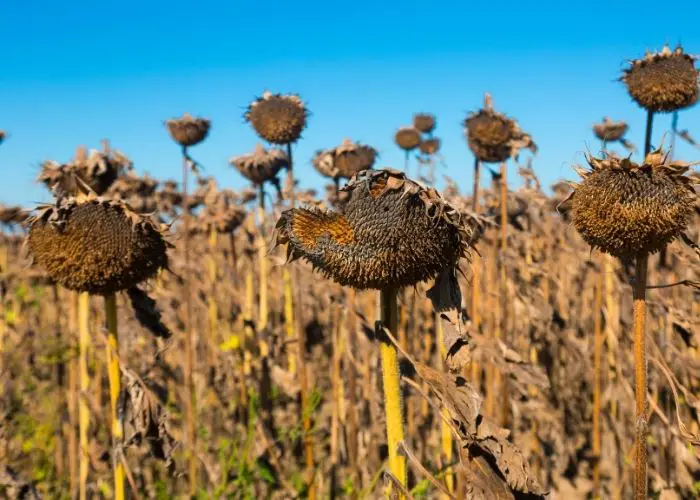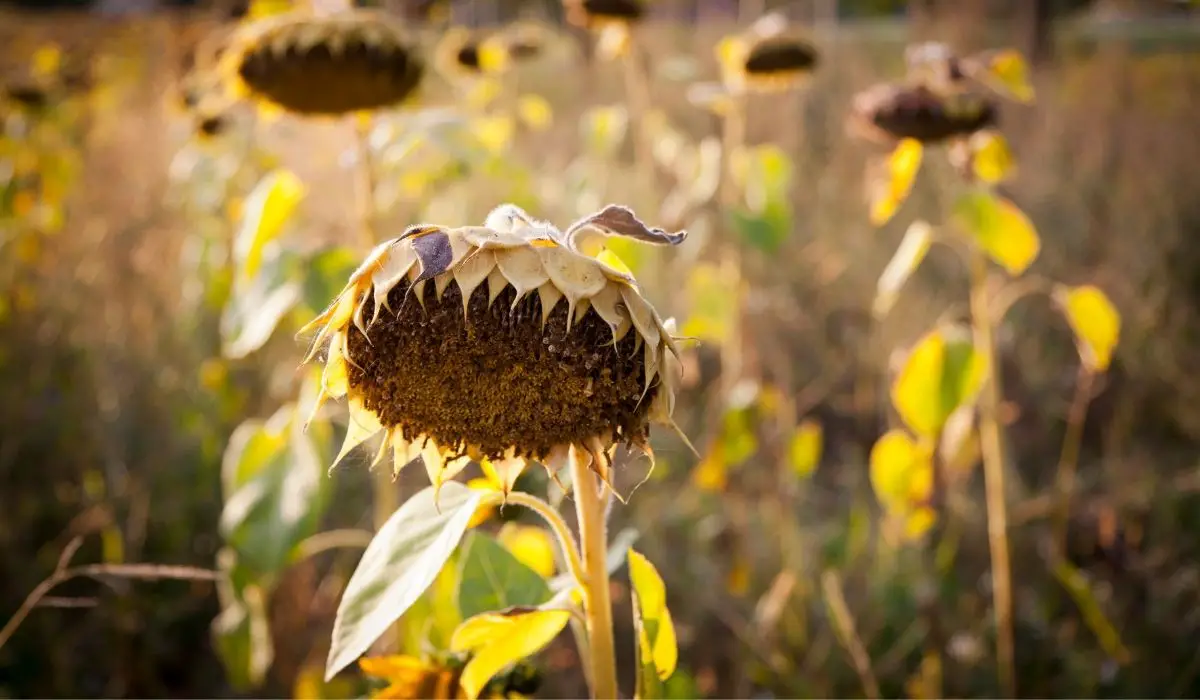Last Updated on August 16, 2022 by Griselda M.
Some gardeners may be asking themselves “Why Are My Sunflower Leaves Turning Brown?”. Let’s answer this question.
Sunflowers are beautiful plants that also form an important backbone of our world food economy. Sunflower oil is important for many food ingredients, and of course, the oil cake that is left after making oil is a crucial part of many animal feeds including chicken feed, pork, beef, and lamb rations. Without sunflowers, our lives would have less milk, eggs, meat, and cheese to mention a few.
There are a number of different factors that can cause sunflower leaves to turn brown – when this happens, the overall efficiency of our plants is reduced/killed and as a result, we get less/no crop. Why are my sunflower leaves turning brown – find out why, and what to do about it.
Things To Know About Looking After Sunflowers
Many people around the world grow sunflowers in their yards. Sunflowers are beautiful flowers that are very easy to grow. However, there are some things that need to be done right to ensure that the sunflower grows to its full potential.
These plants can grow in relatively poor soil, with relatively little water and still produce a crop. If you give them a bit of help they can do even better. However, I have found that year on year, pathogens build up and your yields can decline.

Why are my sunflower leaves turning brown?
In my experience the most common cause of Sunflower leaves turning brown tends to be rust. I used to pollinate sunflowers (among the many hats I wear, one is beekeeper). We always had to be in communication with the farmers because if they suddenly decide to spray for a pest, you need to know if this is a spray that will kill your bees. Luckily the sprays they used for rust kill fungi not bees.
Brown rust
Brown rust of sunflowers is caused by the fungus Puccinia helianthi. This fungus has a really complex lifecycle and it becomes established in your soil. Once it is in the soil, it will reinfect your plants each year. If you have sunflowers that are growing and they begin to show brown spots under the leaves this is rust.
Typically, we should aim to have sunflowers bloom in the warmest, most humid months of the year – this encourages the best pollination of the flowers and the best seed set. However, warm humid weather, coupled with wet leaves from rainfall and dew encourage brown rust. For the USA it appears that fungicides containing Triazole or Strobilurin are the most recommended.
In my garden, I only grow a small number (maybe 100-200 plants maximum) every year, mainly to keep pollinators busy and provide some fun for my chickens. Throwing a sunflower head into the chicken cage gives them hours of entertainment pecking the seeds out of the head. I have found that I just keep seeds from plants that did not show any fungal problems, and over the years my Zimbabwean land race sunflowers seem to have become rust free. I got three sunflower seeds mixed in some rice a friend brought as a gift from Zimbabwe in the early 2000’s!
Sunburn/drought
A sunflower is a pretty tough plant and can handle very high temperatures. If you do however have some really hot weather that coincides with the soil being dry, then you will sometimes find the leaves can get these sunburn spots. I have had this happen a few times. There is not much you can do about it – try to keep your sunflowers irrigated a bit if there is really hot weather on its way.
Sunburnt leaves tend to look green with a patch that develops that is first white/yellow then goes brown and then it falls out of the leaf leaving a hole. Sometimes the whole leaf dies.
How To Stop Sunflower Leaves Turning Brown?
1. Seed selection
I would suggest speaking to people in your area and finding out which rust resistant seeds do well in the area. Get some of these seeds. If they are heirloom seeds you can keep the best seeds each year, and you will with time develop a locally adapted rust resistant strain of your own.
If you buy rust resistant hybrid seeds, you cannot grow these in the second year. Hybrid seeds are a cross between two strains of sunflower – and when you use the seeds from a plant you grow from one of these, the genetics will be all over the place and you end up with some really funny looking sunflowers. So, if you see the words Hybrid on a pack of seeds, only ever grow these once.
The hybrid seeds are also intellectual property of somebody, so to try and grow them a second year from the seeds amounts to theft. This is why I like Heirloom seeds – we give these as gift from generation to generation and expect nothing in return other than love and respect for the gift of gardening.
2. Mulch
I always mulch my sunflowers early in the season when the plants reach about 6-8″ in height. I use lawn clippings and leaves as a mulch. This covers the soil with new organic matter. The rust spores lurk in the soil, hence covering the soil with new organic matter stops the spores getting into the air and stops them finding you sunflowers.
3. Irrigation
I always try to irrigate sunflowers so that I apply water directly to the roots and not the whole plant. In my area we typically are fortunate to have a late summer drought, which is perfect for sunflowers as it stops the rust problems. If however it gets too dry, we do need to irrigate to stop the plants getting sunburnt in the peak summer days.
If you use microjets that spray in the root zone, or drip irrigation, or flood irrigation if you have abundant water, this stops the leaves getting damp. This in turn stops fungal issues developing. I also find that wetting sunflower leaves seems to cause a host of other problems as I think sometimes salts in the water seem to remove the waxy layer on the leaves making them more sensitive to sun. This is just an observation, not a fact.
Find more information about How To Harvest Sunflower Seeds? -An Amazing Guide!
In Conclusion
The main causes, as we have discussed are rust and drought. Both can be managed. Select disease resistant seeds and ensure your plants are mulched, irrigated (at the root level not leaf level) and healthy.
Over irrigation is not needed for sunflowers – these are tough plants. If necessary, apply a registered fungicide. Alternatively use a biological control.
I have no experience with fungal biocontrols for sunflowers, but it appears a few products are entering the market. Experiment with these to reduce your reliance on chemical fungicides. The less toxic chemistry we put into our garden soil the healthier we will be in the long term.
FAQ
Should you cut dead leaves off sunflowers?
If you see that the leaves have little pustules on them this can be sunflower brown rust. Remove these leaves and dispose of them in the municipal waste. This removes the spores from your area completely.
Why are my sunflower leaves turning brown and dying?
The most common cause is brown rust of sunflowers. You can use a fungicide to treat the plants, and in the next season try and buy rust resistant seeds. Reduce aerial irrigation, as this makes the leaves we and encourages fungi.
How to revive sunflowers?
A dead sunflower is jsut that! They are tough, and if you manage to kill one by not giving it water in hot weather there is little chance you can bring it back to life. If it has fungal problems, you can apply a registered fungicide and you may revive the plant. I personally just pull them out if they get really weak. Try the next season again and make sure to mulch your seedlings, choose rust resistant seeds and make sure not to get the leaves wet when you irrigate. If need be, apply a fungicide as per the advice from your local agricultural extension officer.
Read more about Sunflowers Deer Resistant: How To Prevent Deer From Eating Your Sunflowers
Branko is the world‘s most enthusiastic gardener! He is always on the hunt for the perfect flower, bush or tree to add to his ever–growing garden. He is known for his love of all things green, and his passion for nurturing the plants he grows is unmatched. He loves to get his hands dirty and can often be found humbly tending to his garden at all hours of the day. Branko is the go–to guy when it comes to gardening advice – he is always happy to share his knowledge and wisdom with anyone who will listen. He also loves to play pranks on unsuspecting visitors, so beware if you enter his garden!



